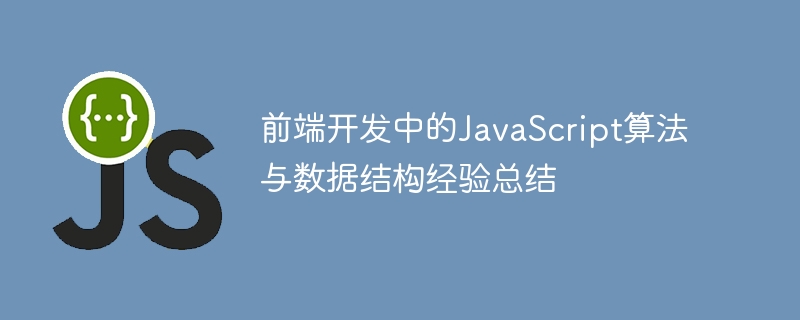Home >Web Front-end >JS Tutorial >Summary of JavaScript algorithm and data structure experience in front-end development
Summary of JavaScript algorithm and data structure experience in front-end development
- PHPzOriginal
- 2023-11-02 18:34:571237browse

Experience summary of JavaScript algorithm and data structure in front-end development
In recent years, the importance of front-end development has gradually highlighted, and the JavaScript language, which is the soul of front-end development, has also Continuously develop and evolve. As the cornerstone of computer science, algorithms and data structures also play an important role in front-end development. This article will combine personal experience to summarize some experiences and techniques in using JavaScript algorithms and data structures in front-end development.
1. Sorting algorithm
The sorting algorithm is one of the basic algorithms often used in front-end development. In JavaScript, implementing a sorting algorithm can be accomplished by using the sort method of an array. The following are some common examples of sorting algorithms:
- Bubble sort
Bubble sort is a basic exchange sorting algorithm that repeatedly scans the sequence to be sorted and compares the sizes of adjacent elements in turn. And exchange positions to achieve the purpose of sorting. - Selection sort
Selection sort is a simple and intuitive sorting algorithm that divides the sequence to be sorted into sorted and unsorted parts, and selects the smallest (or largest) from the unsorted sequence each time elements are placed at the end of the sorted sequence until all elements are sorted. - Insertion sort
Insertion sort is a simple and effective sorting algorithm. By dividing the sequence to be sorted into sorted and unsorted parts, each time an element is selected from the unsorted sequence and inserted into the sorted part. appropriate position in the sequence until all elements are sorted. - Quick sort
Quick sort is a commonly used and efficient sorting algorithm. By selecting a benchmark element, the sequence is divided into two parts, one part is all elements smaller than the benchmark element, and the other part is all elements greater than the benchmark element element of the element, and then recursively sort both parts until the entire sequence is sorted.
The above are just some common sorting algorithms. In actual applications, more appropriate sorting algorithms can be selected according to specific scenarios.
2. Stack and Queue
Stack and queue are two common data structures, which are quite useful in front-end development. The stack is a last-in-first-out (LIFO) data structure, while the queue is a first-in-first-out (FIFO) data structure.
In JavaScript, arrays can be used to simulate stacks and queues. For example, the push and pop methods of an array can be used to simulate the push and pop operations of the stack, while the push and shift methods of the array can be used to simulate the enqueue and dequeue operations of the queue.
3. Binary trees and graphs
In front-end development, binary trees and graphs are also common data structures. A binary tree is an ordered tree structure with each node having at most two child nodes. A graph is a data structure used to describe relationships between things, consisting of nodes and edges.
In JavaScript, objects can be used to represent binary trees and graphs. For example, you can use properties of objects to represent nodes and arrays to represent edges.
4. Dynamic programming
Dynamic programming is a common algorithm design and optimization technology. By dividing the problem into multiple sub-problems, it can reduce repeated calculations and improve the efficiency of the algorithm.
In front-end development, dynamic programming can be applied to some problems that require recursive solutions, such as solving the nth term in the Fibonacci sequence. By using the idea of dynamic programming, the problem can be decomposed into solving the first two terms in the Fibonacci sequence, and then solved step by step, avoiding repeated calculations.
5. Optimization Algorithm
In front-end development, optimization algorithm is an important topic. By optimizing codes and algorithms, web page performance can be improved and user experience improved.
In JavaScript, you can use some performance optimization techniques, such as avoiding excessive loops, reducing DOM operations, etc. In addition, using algorithm optimization can improve the running efficiency of the code, such as using dynamic programming, divide and conquer method, etc.
To sum up, JavaScript algorithms and data structures play an important role in front-end development. By mastering some common sorting algorithms, stacks and queues, binary trees and graphs, dynamic programming and optimization algorithms, you can improve the efficiency and quality of front-end development and achieve a better user experience. I hope this article will be helpful to front-end developers.
The above is the detailed content of Summary of JavaScript algorithm and data structure experience in front-end development. For more information, please follow other related articles on the PHP Chinese website!

